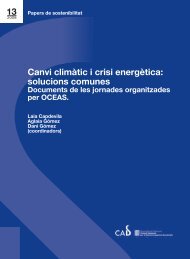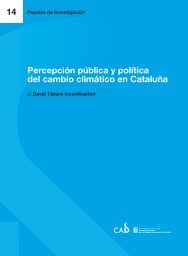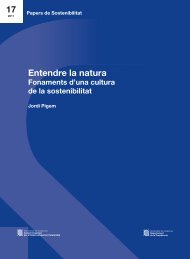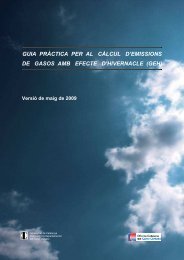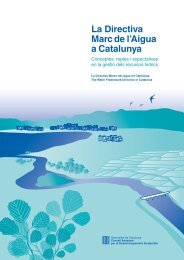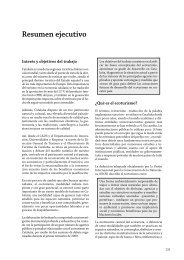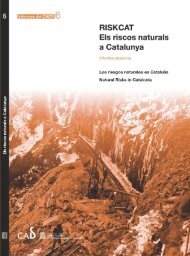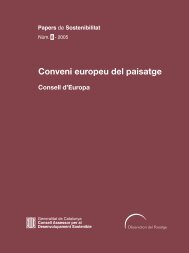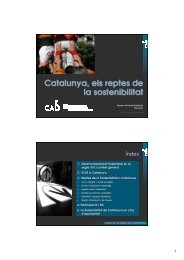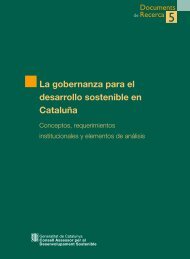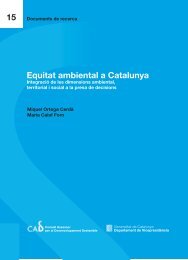Estratègies per al desenvolupament sostenible - Generalitat de ...
Estratègies per al desenvolupament sostenible - Generalitat de ...
Estratègies per al desenvolupament sostenible - Generalitat de ...
Create successful ePaper yourself
Turn your PDF publications into a flip-book with our unique Google optimized e-Paper software.
4.4.5. Scenario <strong>de</strong>velopment. Scenarios are powerful tools for addressing what isboth fundament<strong>al</strong>ly significant and profoundly unknowable – the future. Whereasforecasts predict patterns extrapolated from the past into the future, scenariospresent plausible, <strong>per</strong>tinent, <strong>al</strong>ternative “stories”. They rely on imaging thefuture, rather than extrapolating from the past. Yet they are not predictions,but are means to explore options and test their robustness or sensitivity. Assuch, they can help to build the capacity to assess change, to look for majorshifts rather than assume continued trend, and to build creativity and resilienceto <strong>de</strong><strong>al</strong> with such shifts. The assumptions behind each scenario are as importantas the scenario itself and need as much discussion.Scenarios might regularly be <strong>de</strong>veloped to assist in NSSDs by consi<strong>de</strong>ringthe likely environment<strong>al</strong>, soci<strong>al</strong> and economic consequences of trends in keyvariables such as <strong>de</strong>mographics, politic<strong>al</strong> risk, consumption and production,and/or the consequences of taking particular actions or policy options. Differentscenarios can be constructed to maximize, minimize or optimize theenvironment<strong>al</strong>, soci<strong>al</strong> and economic consequences as appropriate.Scenarios <strong>de</strong>pend on good knowledge of the past and present, and goodjudgement regarding the issues that may matter. Scenario approaches canbe ex<strong>per</strong>t-based (in which case multiple disciplines are <strong>de</strong>sirable, to be ableto assess the multiple dimensions and access/interpret data) or participatoryin the sense that stakehol<strong>de</strong>rs get together to <strong>de</strong>velop an exercise (in whichcase profession<strong>al</strong> facilitation is <strong>de</strong>sirable). The <strong>de</strong>scriptions of <strong>al</strong>ternativescenarios need to be useful to many people involved in strategy <strong>de</strong>bate and<strong>de</strong>cision-making 7 .There is consi<strong>de</strong>rable ex<strong>per</strong>ience in the use of scenario planning in the privatesector. For example, Shell Internation<strong>al</strong> (still consi<strong>de</strong>red by many to be a lea<strong>de</strong>rin the field) has <strong>de</strong>veloped glob<strong>al</strong> scenarios for 1995–2020 to help preparefor discontinuities and sud<strong>de</strong>n change, to create unifying themes and images,and to help foster cohesion within the company 8 . In 1997, the World BusinessCouncil for Sustainable Development (WBCSD) <strong>al</strong>so ex<strong>per</strong>imented with a setof three glob<strong>al</strong> scenarios that explore and aim to stimulate broad discussionon possible responses to the ch<strong>al</strong>lenge of sustainable <strong>de</strong>velopment. TheWBCSD recognized that scenarios have various applications:7 Lester Brown, State of the World 2001. Worldwatch Institute in Association with Earthscan. London.1508 Shell Internation<strong>al</strong> (1996), Glob<strong>al</strong> Scenarios 1995-2020. Shell Internation<strong>al</strong>. London.




